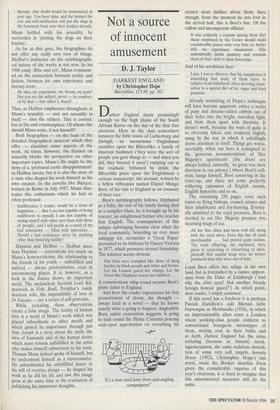Not a source of innocent amusement
D. J. Taylor
DARKEST ENGLAND by Christopher Hope Macmillan, £15.99, pp. 282 Darkest England starts promisingly enough on the high plains of the South African Karoo on the day of the first free elections. Here in the dust somewhere between the little towns of Lutherburg and Zwingli, an anonymous Englishman stumbles upon the Blitzerliks, a family of itinerant bushmen ('they were the sort of people you gave things to — and when you did, they boozed it away') camping out at the roadside. Inflamed by drink, the Blitzerliks press upon the Englishman a curious manuscript: the account, written by a fellow tribesman named Daniel Mungo Booi, of his visit to England as an emissary of their race.
Booi's autobiography follows. Orphaned as a baby, the rest of his family having died in a campfire blaze, he is brought up by his rescuer, an enlightened fanner who teaches him English. The consequences of this unique upbringing become clear when the local community, bewailing an ever more unhappy lot, reconsider a 'Great Paper' presented to its forbears by Queen Victoria in 1877, which promises eternal friendship. The solution seems obvious:
Our lives were trampled like those of dung beetles by black people and white and brown. Let the Lioness guard her whelps. Let the Great She Elephant rescue her children ...
A conscientious whip-round secures Booi's plane ticket to England.
And here the reader experiences his first presentiment of doom, the thought — always fatal in a novel — that he knows exactly what is going to happen. Anglophile Booi, satiric convention suggests, is going to trail round the Home Counties pouring wide-eyed approbation on everything his 'It's a hate mail letter from anti-angling campaigners!' creator most dislikes about them. Sure enough, from the moment he sets foot in the arrival hall, this is Booi's line. Of the callow and incompetent official:
It was evidently a custom among them that those employed by the Crown should wield considerable power with very little or, better still, no experience whatsoever. This undoubtedly instils modesty and reminds them of their debt to their Sovereign.
And of his scrofulous face:
Later I was to discover that his complexion is something that many of them strive to achieve from babyhood, often devoting them- selves to a special diet of fat, sugar and fried potatoes.
Already something of Hope's technique will have become apparent: entice a series of puny and disease-ridden rabbits out of their holes into the bright, merciless light, and blow them apart with thermite. It doesn't work, because the want of guile is so obviously faked, and rendered slightly smug by the way in which it unfailingly draws attention to itself. Things get worse, inevitably, when our hero is consigned to the 'generous accommodation' of 'Her Majesty's apartments' (the doors are always locked, naturally, 'so great was their devotion to our privacy') where Booi's cell- mate hangs himself, Booi conniving in the cover-up, and there are some perfectly withering exposures of English racism, English hypocrisy and so on.
The remaining 250 pages cover such topics as flying bishops, council estates and their inhabitants and fox-hunting. Eventu- ally admitted to the royal presence, Booi is startled to see Her Majesty produce two steaming mugs of tea:
All her fine china had been sold off, along with the royal silver. Even this line of royal merchandise . . . had proved quite useless. The royal offspring, she explained, were given to separating or remarrying so unex- pectedly that nuptial mugs were no sooner produced than they were out of date.
Loyal Booi offers her refuge in his own land, but is forestalled by a cameo appear- ance from the Duke of Edinburgh (And why the slitty eyes? Not another bloody foreign honour guard?') At which point, dear reader, I simply screamed.
If this novel has a forebear it is perhaps Patrick Hamilton's odd Marxist fable Impromptu in Moribundia (1938), in which an impressionable alien tours a London where working-class people conform to conventional bourgeois stereotypes of them, storing coal in their baths and so forth. Darkest England has the same irritating (because so blatant) mock- ingenuousness, the same sedulous demoli- tion of some very soft targets. Serenity House (1992), Christopher Hope's last novel, made the Booker shortlist. Even given the considerable vagaries of this year's chairman, it is hard to imagine that this misconceived successor will do the same.


























































 Previous page
Previous page